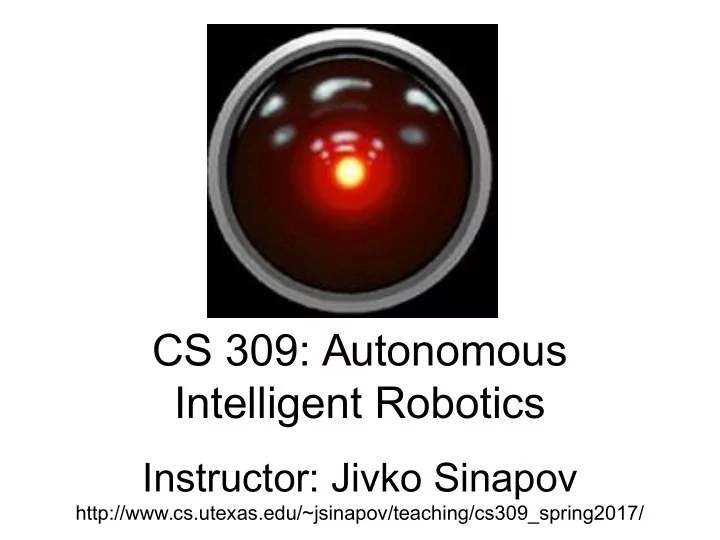

CS 309: Autonomous Intelligent Robotics Instructor: Jivko Sinapov http://www.cs.utexas.edu/~jsinapov/teaching/cs309_spring2017/
Overview of the Class • Quick Intro • Syllabus • Class Goals • Policies and Procedures
Class Web Page http://www.cs.utexas.edu/~jsinapov/teaching/cs309_spring2017/
Class Goals At the end of this class you will have an understanding of the current state of the art in autonomous robotics and will be able to contribute to original research conducted in our lab.
Topics to be Covered • Introduction to robotics • Robot Operating System (ROS) • Robot Control • Autonomous Navigation and Localization • 2D and 3D Computer Vision • Computational Perception • Human-Robot Interaction • Developmental Robotics
Organization* This class will be taught as a seminar. The students will be expected to read the assigned papers for each lecture in advance and to actively participate in class discussions. * The instructor reserves the right to change any and all aspects of this class for whatever reason or no reason at all (a.k.a., academic freedom). ** You agree that I have the unconditional right to exercise this discretion in a way that is most favorable or convenient to me.
Prerequisites (2 out of 3) (all episodes) (all episodes) (all episodes)
Prerequisites Programming skills will be required for the homework assignments and for the final project. The most important prerequisite of all, however, is your interest in the course, motivation, and commitment to learning.
Prerequisites A strong interest in the question, ``What is intelligence and how can it be implemented in a physical robot?'' For best results take two lectures weekly. Common side effects may include sleepless nights, broken robots, nervousness, and banging head on keyboard. Frequent visits to the mentors and the TA have been shown to alleviate some of those symptoms. Talk to your instructor if this class is right for you.
Students with Disabilities The University of Texas at Austin provides upon request appropriate academic accommodations for qualified students with disabilities. To determine if you qualify, please contact the Dean of Students at 471-6529; 471-4641 TTY. If they certify your needs, I will work with you to make appropriate arrangements. No retroactive accommodations will be provided in this class (within reason of course).
Homework Assignments There will be two types of assignments: 1) Weekly responses to readings on Canvas 2) Programming Assignments (weekly or bi- weekly)
Reading Responses - 10 total posts, at least 5 must be original posts (not responses to others)
Final Project The final project must be a research or design project that is related to the topics covered in class. You may choose to work individually or in small groups (2-3 members each). Working in groups, however, is highly recommended. You are encouraged to select a topic for your final project as soon as possible. A written project proposal (2-3 pages) will be due on March 21. The final project report (6-8 pages) will be due on May 11. Each team will be required to present the results of their final project during the finals period for this class.
Policy on Collaboration You are encouraged to form study groups and discuss the reading materials assigned for this class. You are allowed to discuss the homework assignments with your colleagues. However, each student will be expected to write his own solutions/code. Sharing of code is not allowed.
IMPORTANT • Cheating, plagiarism, and other academic misconducts will not be tolerated and will be handled according to UT's academic dishonesty procedures, which are posted here: http://www.cs.utexas.edu/users/ear/CodeOfConduct.html#honesty
Attendance You are expected to attend every class and actively participate in the discussions. If you miss a class, it is your responsibility to find out what we talked about, including any announcements.
Grading Your grade will be determined as follows: • Class Participation: 10% • Reading Responses: 10% • Homework Assignments: 60% • Final Project: 20%
How Difficult is this Class?
Programming Languages • C and/or C++ • Python
About the lab... http://www.cs.utexas.edu/~larg/bwi_web/
Readings for this week Irfan A. Essa (1999). ``Computers Seeing People'', AI Magazine 20(2): pp. 69-82. Weng, et al. (2001), ``Autonomous Mental Development by Robots and Animals'', Science, v. 291, no. 5504, pp. 599-600. Rosenthal, Stephanie, Joydeep Biswas, and Manuela Veloso. "An effective personal mobile robot agent through symbiotic human-robot interaction." Proceedings of the 9th International Conference on Autonomous Agents and Multiagent Systems, 2010.
THE END
Recommend
More recommend